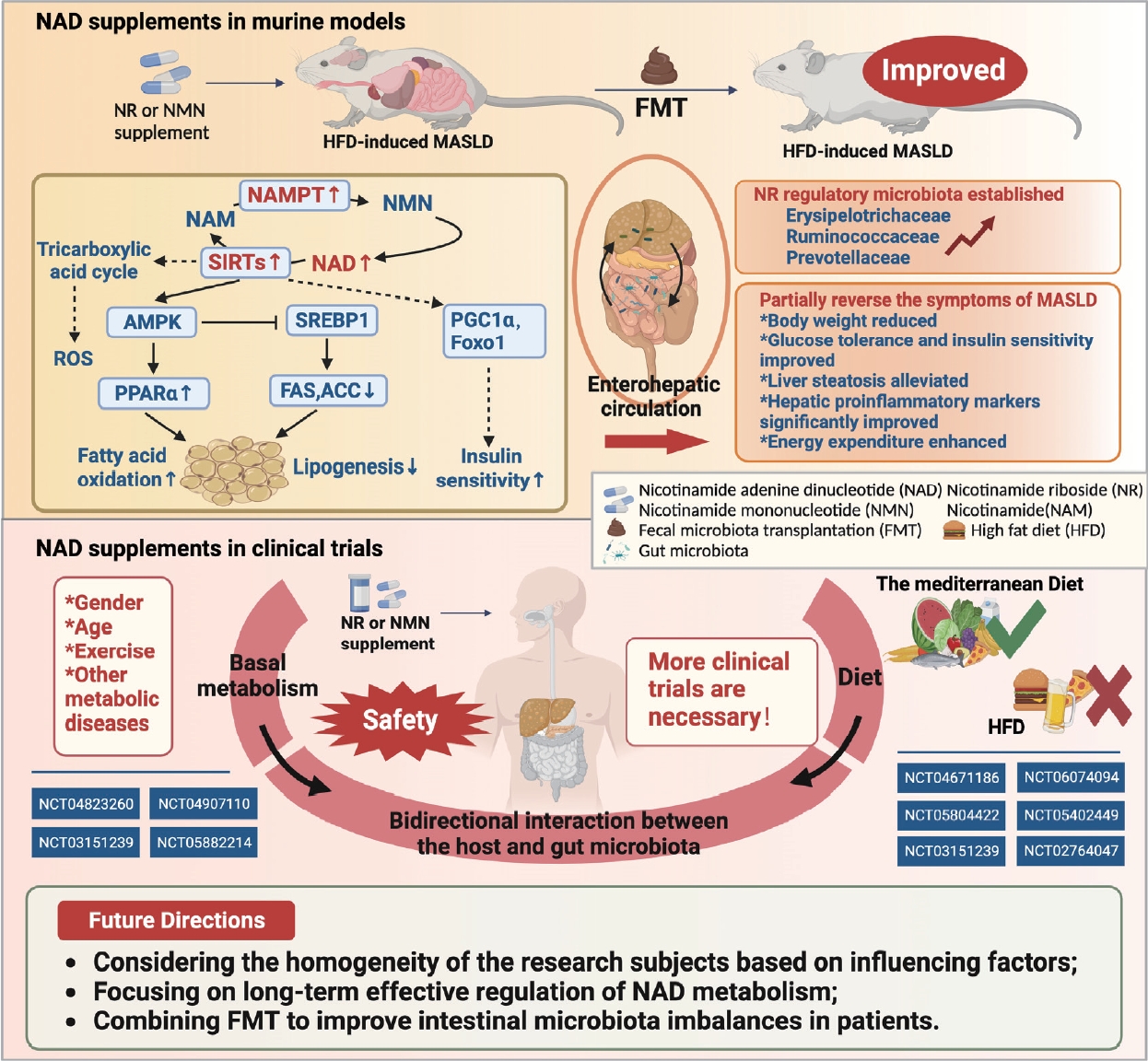| Clin Mol Hepatol > Epub ahead of print |
Supplementation with nicotinamide adenine dinucleotide (NAD) precursors plays a crucial role in metabolic regulation, revealing significant therapeutic potential in clinical trials, particularly for high-risk factors associated with metabolic dysfunction-associated steatotic liver disease (MASLD), such as enhancing cardiovascular health, lowering low density lipoprotein and triglyceride levels, and boosting pancreatic cell sensitivity, however, its efficacy in treating MASLD has received varied evaluations.
Extensive research has demonstrated the effectiveness of NAD precursors in markedly improving metabolic levels in MASLD in murine models. These studies highlight a profound enhancement in metabolic health in cases of MASLD, particularly through the administration of nicotinamide riboside (NR) and nicotinamide mononucleotide (NMN). In models of high-fat diet-induced MASLD, treatment with NR (400 mg/kg/day for one week), optimizes NAD levels in critical areas such as the liver and muscle mitochondria, leading to metabolic improvements. Results show a 40% reduction in liver triglycerides and nearly 50% decrease in fasting insulin levels, indicating a notable improvement in key metabolic parameters [1]. Furthermore, these studies have uncovered novel mechanisms, including the activation of sirtuins pathways and the NAMPT-SIRT1-AMPK axis, which are instrumental in inducing lipolysis and mitigating liver steatosis [2]. These innovative discoveries pave the way for new therapeutic strategies in MASLD, although their application in human clinical settings awaits further exploration.
Despite FDA approval of NAD precursors such as NMN or NR trials, their clinical efficacy in MASLD remains inconsistent. The discrepancy in clinical outcomes compared to animal studies necessitates careful consideration of the following points in current and upcoming clinical research:
1. The effectiveness of NAD metabolism on MASLD treatment is significantly influenced by various factors, such as age, gender, basal metabolism, and diet. For instance, a study by Yoshino et al. [3], which was a 10-week randomized, placebo-controlled, double-blind trial, exemplifies the necessity of acknowledging these elements. The study focused on a homogeneous group of 25 postmenopausal women with prediabetes and obesity or overweight conditions. It was observed that NMN supplementation at a dose of 250 mg/day improved muscle insulin sensitivity by 25┬▒7%, emphasizing the need for personalized treatment strategies.
2. The efficacy of long-term supplementation with NAD precursors may be limited due to the bodyŌĆÖs metabolic compensation, which is influenced by the circadian regulation of NAD levels. While short-term use of 1 g NAD precursor supplements boosts metabolic levels, extended use fails to significantly increase NAD beyond baseline levels [4]. This suggests the necessity for further modulation of NAD metabolism. In a notable study by Dellinger et al. [5], within a 6-month prospective, randomized, double-blind, placebo-controlled clinical trial, the combined effects of NR and Pterostilbene (a SIRT1 activator) on MASLD were examined. The study demonstrated that treatment with 500 mg of NR and 100 mg of pterostilbene led to nearly a 20% decrease in alanine transaminase and gamma glutamyl transferase levels over time, indicating that activating NAD enzymes may sustain NAD metabolism for long-term therapeutic benefit.
3. Fecal microbiota transplantation (FMT) also presents a promising direction, particularly for MASLD patients with gut microbiota imbalances. This imbalance affects the conversion and effectiveness of NAD precursor supplements. A clinical trial revealed that MASLD patients receiving FMT, along with diet and exercise, experienced improved gut microbiota composition and a reduction in fat attenuation in lean MASLD patients decreased to normal levels [6]. Key bacterial strains like Ruminococcus 2 and Prevotella 2, which are involved in regulating NAD, were significantly increased, along with findings from animal studies with NR supplementation [7]. Therefore, FMT, in conjunction with diet and exercise, might improve gut microbiota in MASLD patients, potentially boosting the efficacy of NAD supplements as an auxiliary therapy.
In summary, although NAD precursor supplementation exhibits promise in treating MASLD, comprehensive understanding of its long-term effects and efficacy across diverse populations remains necessary. Based on individual metabolic profiles, strategies like activating sirtuins or FMT should be incorporated for enhanced effectiveness.
ACKNOWLEDGMENTS
This work was supported by Qinghai Province Key Research and Development and Transformation Plan Specific fund of Science and Technology Assistance to Qinghai (No. 2022-QY-216).
Figure was created with BioRender.com.
FOOTNOTES
REFERENCES
1. Cant├│ C, Houtkooper RH, Pirinen E, Youn DY, Oosterveer MH, Cen Y, et al. The NAD(+) precursor nicotinamide riboside enhances oxidative metabolism and protects against high-fat diet-induced obesity. Cell Metab 2012;15:838-847.



2. Wu K, Li B, Ma Y, Tu T, Lin Q, Zhu J, et al. Nicotinamide mononucleotide attenuates HIF-1╬▒ activation and fibrosis in hypoxic adipose tissue via NAD+/SIRT1 axis. Front Endocrinol (Lausanne) 2023;14:1099134.



3. Yoshino M, Yoshino J, Kayser BD, Patti GJ, Franczyk MP, Mills KF, et al. Nicotinamide mononucleotide increases muscle insulin sensitivity in prediabetic women. Science 2021;372:1224-1229.



4. Li X, Yang H, Jin H, Turkez H, Ozturk G, Doganay HL, et al. The acute effect of different NAD+ precursors included in the combined metabolic activators. Free Radic Biol Med 2023;205:77-89.


5. Dellinger RW, Holmes HE, Hu-Seliger T, Butt RW, Harrison SA, Mozaffarian D, et al. Nicotinamide riboside and pterostilbene reduces markers of hepatic inflammation in NAFLD: A doubleblind, placebo-controlled clinical trial. Hepatology 2023;78:863-877.



-
METRICS

-
- 0 Crossref
- 0 Scopus
- 1,326 View
- 49 Download
- ORCID iDs
-
Yu Chen

https://orcid.org/0000-0001-9420-1636Daozhen Chen

https://orcid.org/0000-0003-4791-8065 - Related articles




 PDF Links
PDF Links PubReader
PubReader ePub Link
ePub Link Full text via DOI
Full text via DOI Download Citation
Download Citation Print
Print



